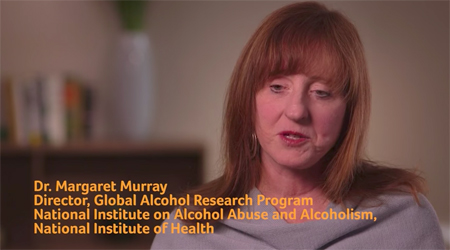NIAAA Directors Stumping for Big Alcohol
 Imagine the glee the foxes would feel if the hens willingly walked into foxhouse. Less than 30 seconds into a social responsibility advertisement for alcohol giant AB InBev, we see Dr. Margaret Murray, Director of the Global Alcohol Research Program at the National Institute on Alcohol Abuse and Alcoholism (NIAAA). She briefly extols the virtues of AB InBev's "Six Cities" project. Before her, AB InBev CEO Carlos Brito introduces the company's efforts; after her, Dr. Derek Yach, AB InBev Global Advisory Council Member, asserts how their efforts will be a great benefit to the company. Dr. Murray looks calm and comfortable sandwiched between them. Later in the video, Dr. George Koob, Director of NIAAA, appears, similarly comfortable.
Imagine the glee the foxes would feel if the hens willingly walked into foxhouse. Less than 30 seconds into a social responsibility advertisement for alcohol giant AB InBev, we see Dr. Margaret Murray, Director of the Global Alcohol Research Program at the National Institute on Alcohol Abuse and Alcoholism (NIAAA). She briefly extols the virtues of AB InBev's "Six Cities" project. Before her, AB InBev CEO Carlos Brito introduces the company's efforts; after her, Dr. Derek Yach, AB InBev Global Advisory Council Member, asserts how their efforts will be a great benefit to the company. Dr. Murray looks calm and comfortable sandwiched between them. Later in the video, Dr. George Koob, Director of NIAAA, appears, similarly comfortable.
They should not feel that way. They are either being duped in the way Big Tobacco and Big Sugar (not to mention Big Alcohol!) have duped thousands before them, or they are complicit in recklessly undermining the mission of their institute.
This appearance by Dr. Murray constitutes nothing less than an abandonment of duty by a public official, argues Dr. Michael Siegel, Professor of Community Health Sciences at Boston University, in an October 30, 2017, blog post. "They are actually promoting and endorsing a company product or service. By doing so, the NIAAA has participated in a marketing ploy of the company. Essentially, NIAAA is helping Anheuser-Busch to market beer ... ," he writes.
This appearance comes hot on the heels of a major, multi-million-dollar grant from Big Alcohol to the Foundation of the National Institutes of Health. This grant is meant to fund a study the impact of regular "moderate" alcohol use in populations around the world. (There are multiple problems with that study, starting with the meaninglessness of "moderate" drinking; a 10/26/17 Wired magazine provides an excellent roundup of the controversy). Yet the Dr. Murray isn't even addressing that study. She is giving a stamp of approval to an in-house AB InBev project piloting ostensible prevention campaigns meant to reduce "hazardous drinking" by 10% in selected target cities. By doing so, she drops even the veneer of representing the research community; she is simply making AB InBev seem like a reputable source of public health research.
It is not. It cannot be. We have fifty years of experience with the research arms of Big Tobacco contributing to tobacco harm denialism. Even when ostensibly acknowledged harm, Big Tobacco has focused on "reduced harm products," and contributed voluntary prevention messaging. It turned out that reduced harm products either didn't meaningfully reduce harm or else were disliked by consumers. Both helped them put an "evidence-based" polish on continuing to deal in deadly products. And when the tobacco companies attempted to preempt the Truth/Legacy Foundation's antismoking campaigns by running in-house prevention ads, those ads turned out—surprise, surprise—to encourage underage use.
Is it a coincidence, then, that the AB InBev video extols their investment in safer products and prevention messaging?
"Industry money in research distorts research," said Carson Benowitz-Fredericks, MSPH, Research Manager at Alcohol Justice. "Industry money in prevention makes prevention ineffective. Murray and Koob know this. NIAAA has to step back into a national leadership role, not just rubber-stamp Big Alcohol's research agenda."
Dr. Siegel sees NIAAA’s participation as more than just an error in judgment. "With the promotion of Anheuser-Busch's interests that NIAAA is providing, the company hardly needs its own marketing division," he writes. "It can simply call the director of NIAAA it's de facto Director of Marketing and Public Relations. The alcohol industry couldn't have a better friend in a higher place.”
Help us hold Big Alcohol accountable for the harm its products cause.
| GET ACTION ALERTS AND eNEWS |
STAY CONNECTED    |
CONTACT US 24 Belvedere St. San Rafael, CA 94901 415-456-5692 |
SUPPORT US Terms of Service & Privacy Policy |


